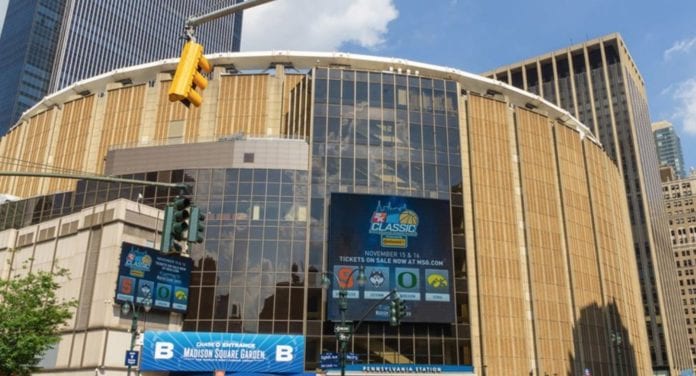Joining 13 NFL stadiums, basketball and hockey venues getting mmWave 5G
On Friday Verizon announced it has activated its millimeter wave-based 5G network in three sports venues, has a fourth venue “coming soon,” and will launch at six additional facilities by the end of the 2019-2020 NBA and NHL seasons.
The next-gen network is now live at Talking Stick Resort Arena in Phoenix, Arizona, which hosts the NBA’s Phoenix Suns; the Chase Center in San Francisco where the Golden State Warriors play; and Denver’s Pepsi Center, which serves as home base for the NBA’s Nuggets and the NHL’s Avalanche. Verizon is working to activate 5G in Madison Square Garden in New York City, where the Knicks and Rangers play.
This is the latest in Verizon’s investment in 5G for sports venues. In September the carrier said it would bring 5G to 13 NFL stadiums to correspond with the league’s 100th season. The stadiums include Bank of America Stadium in North Carolina, Broncos Stadium at Mile High in Colorado, CenturyLink Field in Washington, Ford Field in Michigan, Gillette Stadium in Massachusetts, Hard Rock Stadium in Florida, and MetLife Stadium in New Jersey. In some cities, the stadium will be the only place with Verizon 5G Ultra Wideband service.
Verizon’s VP of Technology Heidi Hemmer, in a statement, said enhanced fan experiences are just one application of 5G, which “is transforming how entire industries operate ranging from entertainment to manufacturing. Having this next generation technology in large venues like arenas should not only enhance the game-day experience for sports fans, but provide greater bandwidth for concert-goes, visitors or business working inside the venue.”
In the context of stadiums, Verizon called out specific 5G-enabled applications using artificial and virtual reality, an early use case that showed up in the 2018 Winter Olympics in PyenongChang, Korea. In fact, Korean operators, which launched the first commercial mobile 5G networks and have seen millions of subscribers, see stadium experiences as a major near-term service.
Millimeter wave frequencies get dinged for limited propagation characteristics and inability to serve indoor environments, but stadiums provide favorable conditions given the relative ease of establishing line-of-sight between radios and user equipment.
Speaking of the NFL announcement, Verizon CEO Hans Vestberg said 5G “is fundamentally changing the way we live, work and play, and we expect the impact on the sports entertainment industry to be massive — it promises to revolutionize the entire game-day experience for fans.”
More on the venue plans, earlier in the Verizon said it will work with venue connectivity specialist Boingo Wireless “to architect a hyper-dense network designed for large and small indoors spaces,” and specifically mentioned “airports, stadiums and areanas, office buildings, hotels, etc..”
For its part, Boingo has also been pursuing its own enhancements to venue connectivity with a focus on the shared 3.5 GHz CBRS band, which has moved through the regulatory process to the Initial Commercial Deployment phase with an auction of priority access spectrum licenses coming up next year. Earlier this year the company set up a trial CBRS private network for the IT department at Dallas’s Love Field.
To put a bow on all this at it were, Boingo CEO Mike Finely is set to take the keynote stage next week at Mobile World Congress Los Angeles alongside Los Angeles Sports and Entertainment Commission President and CEO Kathryn Schloessman to discuss “5G and the next generation of sports and entertainment in Los Angeles.”

